In the Strategy and Master Plan for Vietnam’s Tourism Development to 2030, with a vision to 2040, approved by the Prime Minister, Mau Son Tourism Site (in Lang Son Province) is recognised as one of 46 attractive destinations nationwide.
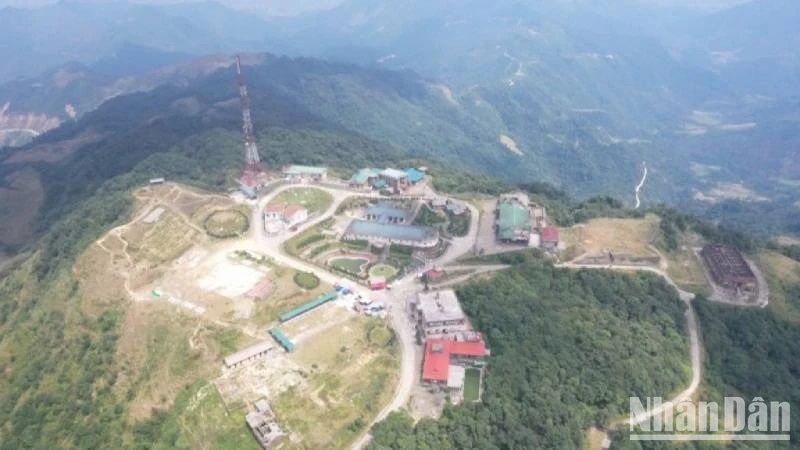
A panoramic view of Mau Son Tourism Area in Loc Binh District (Lang Son Province).
With its magnificent natural landscape and unique tourism potential, Mau Son gathers all the conditions to develop into a national tourism area.
A promising and attractive destination
Chairman of the People’s Committee of Loc Binh District, Trinh Tuan Dong, shared that Mau Son is located across three communes, including Cong Son and Mau Son in Cao Loc District, and Mau Son in Loc Binh District, with a total area of 10,470 hectares.
Mau Son Tourism Site is a complex of about 80 large and small mountains. The highest peaks are Phia Po (Father Mountain), reaching 1,541 metres, and Phia Me (Mother Mountain), standing at 1,520 metres.
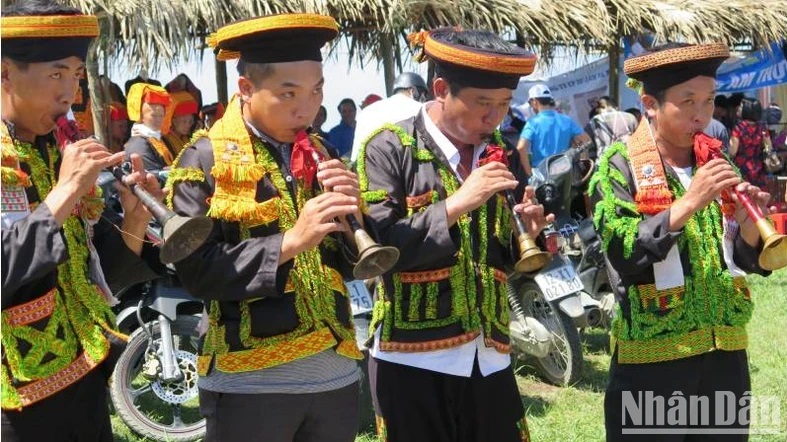
Young men of the Dao ethnic minority group in Mau Son play the Pi Le flute during the spring festival.
Mau Son’s climate features characteristics of both subtropical and temperate regions, with an average annual temperature of 15.6 degrees Celsius and two distinct seasons. From April to October, the weather is cool, with average temperatures ranging from 16 to 21 degrees Celsius, making it ideal for sightseeing and relaxation. In winter, from November to March, the average temperature ranges from 7.2 to 13.2 degrees Celsius, and on the coldest days, it can drop to as low as -5 degrees Celsius, often bringing fog and frost.
Mau Son has a diverse hydrological system with more than ten streams flowing from the mountain peaks, such as Khuoi Lay, Khuoi Tang, Khuon Van, Na Miu, Lap Pia, and Ban Khoai in the south, and Pac Day, Co Khuong, Lang Kim, Khuoi Phieng, and Khuoi Luong in the north. These streams provide an abundant water supply all year round, never drying up.
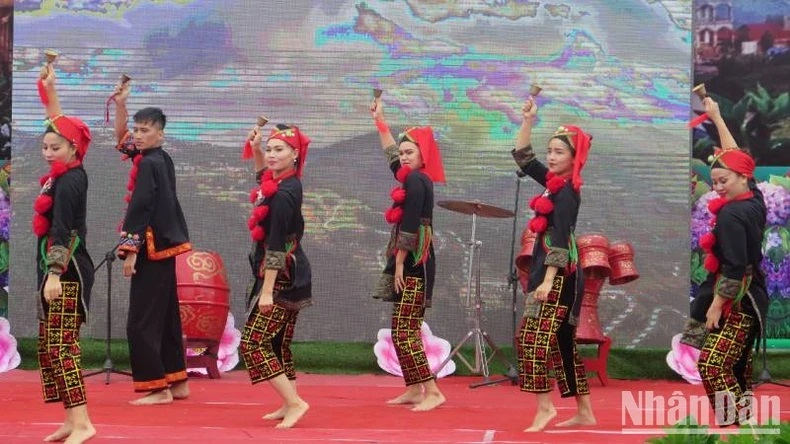
A welcoming dance performance by the Dao people in Mau Son.
The vegetation in Mau Son is rich, covering nearly 5,000 hectares of forest. The natural forest is home to many rare species like oak, chestnut, and agarwood. Some flower species, such as do quyen (rhododendrons) and various beautiful orchids, are exclusive to this mountainous area. Additionally, Mau Son boasts many rare and economically valuable plants and animals, such as ancient snow tea trees, wild peaches, forest lemons, and fragrant frogs.
Spiritual and cultural significance
Beyond its natural beauty, Mau Son is also notably attractive for its spiritual and cultural values, especially the pure ethnic traditions of the local communities.
In terms of spiritual culture, the Mau Son Sacred Realm - Ancient Temple, located in a "prime location" between Father Mountain and Mother Mountain in Lap Pia Hamlet, Mau Son Commune, Loc Binh District, has become shrouded in mysterious legends.
Locals in Mau Son pass down many stories, myths, and legends about this ancient temple, including a particularly captivating tale of "the sacred stones that bleed".
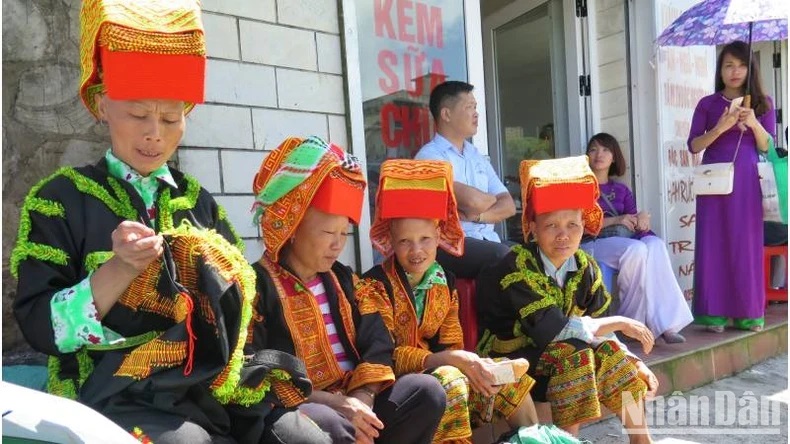
Traditional costume of Dao women in Mau Son.
Director of the Lang Son Provincial Department of Culture, Sports, and Tourism Nguyen Dang An shared, "Since ancient times, the local ethnic communities have used this temple as a spiritual gathering place, a sacred religious and spiritual site. More than just a place of worship, the ancient temple and stone tombs in the Sacred Realm - Ancient Temple area represent cultural strength, symbolising the rich spiritual life of the ancient Tay people”.
Mau Son is also home to legends and folklore about Father Mountain, Mother Mountain, and Phat Chi Mountain. These intangible values, connected to a sacred land, lend Mau Son a unique spiritual appeal.
Mau Son also preserves many traditional cultural values of the Tay, Nung, and Dao ethnic minority groups who live in the surrounding areas. Their cultural heritage remains largely intact.
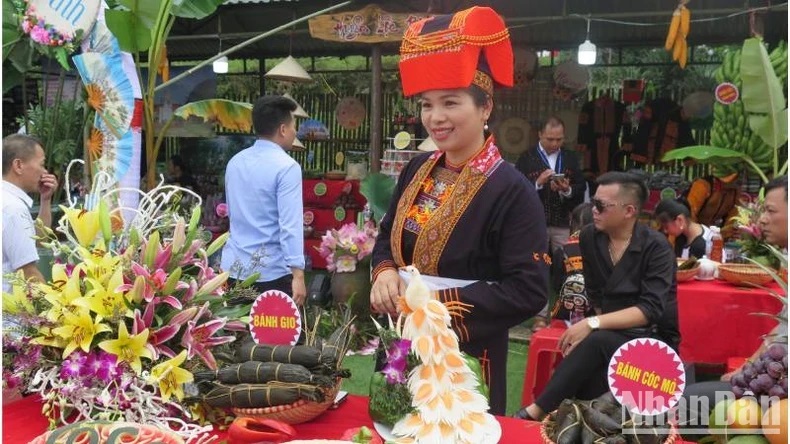
Products from the Dao community in Mau Son are often sold during festivals.
Notable cultural practices include the Cap Sac ritual (a rite of passage declaring the coming-of-age of Dao men within the community), rituals to pray for a good harvest, ancestor worship, worship of the mountain gods, and reverence of Phat Chi Mountain. The traditional houses, clothing, and folk songs, such as the Dao people’s Pao Dung songs and Pi Le flute melodies, along with the Long Tong (going to the field) festival and the Then and Sli songs of the Tay and Nung, all reflect the richness of the region’s heritage.
Mau Son has also been renowned for its distinctive culinary traditions, such as wine made from forest leaves, wild honey, forest lemons, peaches, and snow tea from ancient tea trees that are hundreds of years old and grow on high mountain peaks.
Taping into Mau Son’s tourism potential, in 2022, Lang Son Province began construction on the Mau Son Ecotourism and Cable Car Complex at Mau Son Peak. The project, with a total investment of 7.352 billion VND, has been developed by Sun Group’s Lang Son Sun Company. In the first phase, the project will include key components such as a cable car station, an entertainment zone at the summit, and the Phat Chi spiritual complex, covering over 692 hectares.
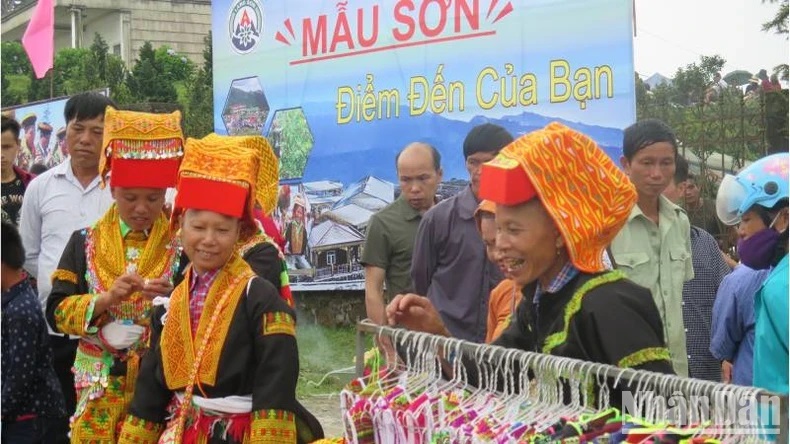
The Dao people in Mau Son participate in spring festivals in the Loc Binh District (Lang Son Province).
The complex is expected to transform Mau Son into a "snow-covered four-season" destination, serving locals and tourists upon completion. The Mau Son Ecotourism and Cable Car Complex is a major project within the plan for Mau Son’s tourism development until 2030, approved by the Prime Minister, to establish Mau Son as a national tourism area. Its distinctive offerings will include mountain resort tourism, cultural, spiritual, and eco-tourism, catering to the Northern Midlands and the entire nation.
Hung Trang, Quoc Dat - Translated by NDO